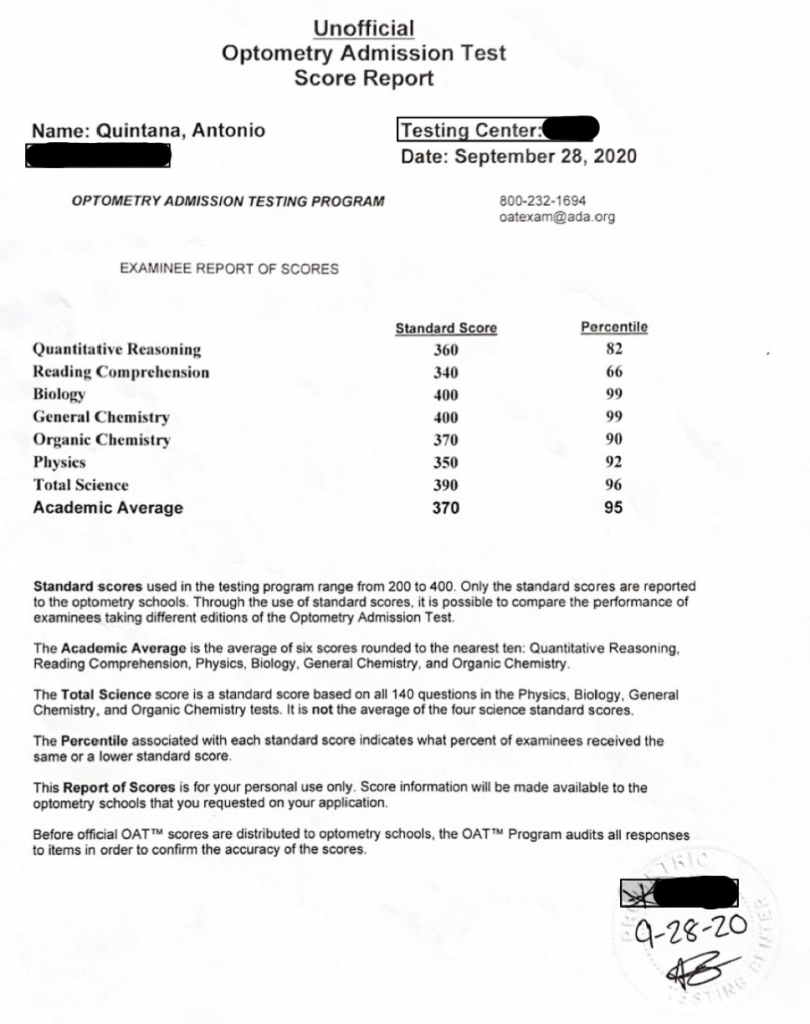Antonio Quintana

I think the very first step in preparing for the OAT is becoming aware of what you don’t know. Being conscious of your own strengths and weaknesses will guide the studying process, and will dictate what subjects require more studying than others. I, for example, was quite weak in physics and math while my background in general chemistry and biology was much stronger. Knowing that, I was able to tailor my own studying process, making sure I was as academically well-rounded as possible.
The second and arguably most important step is finding the right resources to study from. Crack the OAT was a great option for me because of its immense amount of practice problems and tests. Although you can spend hours upon hours a day reading material and trying to take it in, you’ll never really know if you have a grasp on it until you can answer questions on the subject correctly. Crack the OAT offers questions that I thought were very representative of those that you’ll find on the actual OAT, and have just the right amount of difficulty to push you to do better.
How did you use Crack the OAT to prepare for the OAT?
My use of Crack the OAT evolved as the test date came closer and closer.
At around 3 months prior to the test date, I would use Crack the OAT for content review (the one on general chemistry is especially good). After a session of content review, I would take an untimed and relaxed quiz to simply see if I had understood the material. Doing content review and untimed quizzes in total for all the subjects took me about 7 weeks (I’m telling you now it’s a lot of material so use your time efficiently!).
Once I felt like my grasp on the subjects were strong enough, I began to time myself. At first, the rate at which I answered questions turned out to be way too slow, but the fact that there are so many questions on Crack the OAT allows for the continued practice of the overall test-taking process. After some time I was able to tackle each and every question with precision and focus. Everyone is better at some subjects than others, so make sure you know what portions of the test you should dedicate more time to!
At about 2 weeks prior to the test date, I began taking full-length Crack the OAT practice tests. By this time, I had established my knowledge on every subject as best as I could and had the timing of every portion of the test down to the second. By the time the real thing came around, I absolutely crushed it! I was so happy to see that my work had paid off, and thanks to Crack the OAT for helping for sure!
What would you do differently to prepare for the OAT?
Remember, this test is about breadth, not depth! I found myself getting frustrated after not being able to solve some of the longer multi-step problems, but the odds of seeing those types of questions on the OAT are slim. So looking back I wish I wouldn’t have spent as much time trying to understand tiny/minute details.
As far as individual subjects go, I wish I had gone into the test having done more problems for the reading comprehension portion. I was so focused on trying to grasp all the sciences at once that I completely set reading comprehension aside. I ended up only taking two or three of the timed tests on Crack the OAT but I think they were VERY representative of the difficulty and timing of the passages that appear on the OAT are. I ultimately used the search and destroy method the day of, but I definitely could’ve improved this score if I had just set some time for it.
As for math/science, I really think just answering as many practice questions as possible is the best way to identify any areas in need of improvement. I definitely wish I had done that more with math, as there are tons of word problems that they can throw your way. Physics was definitely more conceptual than I thought it would be (lots of forces based questions for me at least) but there’s also a decent chunk that deals with just memorizing the formula and knowing when to apply it.
Overall, don’t stress about it too much! Put in the work and your results will speak for themselves 🙂
Join the Crack the OAT family to gain an advantage on your Optometry Admission Test to score higher, get accepted into optometry school and become an optometrist! Click here!

